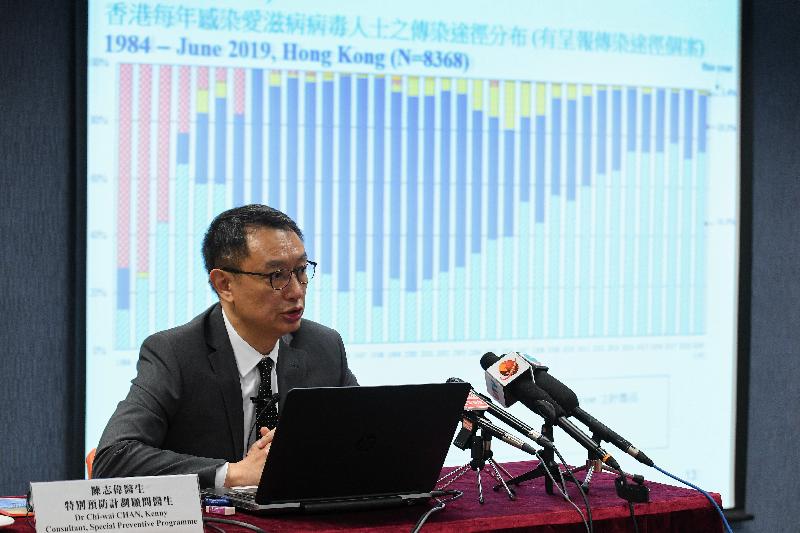A total of 137 additional cases of Human Immunodeficiency Virus (HIV) infection were reported to the Centre for Health Protection (CHP) of the Department of Health (DH) in the second quarter of 2019, bringing the cumulative total of reported HIV infections to 9 998 since 1984.
Reviewing the latest HIV/Acquired Immune Deficiency Syndrome (AIDS) situation in Hong Kong at a press conference today (August 27), the Consultant (Special Preventive Programme) of the CHP, Dr Kenny Chan, said that sexual transmission remained the major mode of HIV transmission and stressed the importance of consistent and proper use of condoms in reducing the risk of contracting HIV.
"HIV is the cause of AIDS and, without treatment, about half of HIV-infected people will progress to AIDS within 10 years. On the contrary, early HIV treatment with antiretroviral drugs helps prevent AIDS and its complications. It also makes a significant contribution towards improving the quality of life and prolongs survival of those infected," Dr Chan said.
"Members of the public with a history of unsafe sex should take an HIV antibody test early. They can call the DH's AIDS Hotline (2780 2211) for a free, anonymous and confidential HIV test. HIV-positive people should seek specialist care as soon as possible," he continued.
He supplemented that the DH has all along been promoting early HIV testing. At-risk populations, including men who have sex with men (MSM), are recommended to have at least annual testing, irrespective of any individually assessed risk of infection. As an additional approach to conventional HIV testing services, HIV self-testing refers to a process in which a user collects his/her own specimen, performs testing and interprets the result. Of note, Dr Chan emphasised that the HIV self-test only serves as a preliminary test and users of any self-test should seek further confirmation by conventional testing if positive. In addition, members of the public should only use qualified test kits. The public may visit the DH website (www.21171069.com/en/get_hiv_tested/self_testing.html) for related information.
The DH is planning a study of using self-tests for MSM to expand testing coverage. The study will examine the feasibility and acceptability of using a web-based system that allows ordering of HIV test kits and uploading of test results. Confirmatory testing will be provided to those who have self-tested positive. Medical care will also be provided for the infected patients.
Of the 137 HIV cases, involving 116 males and 21 females, reported in the second quarter, 70 acquired the infection via homosexual or bisexual contact, 25 via heterosexual contact and one via drug injection. The routes of transmission of the remaining 41 cases have yet to be determined due to incomplete information upon notification.
The new cases were mainly reported by four major sources: public hospitals, clinics and laboratories (68 cases); private hospitals, clinics and laboratories (22 cases); DH AIDS Unit (19 cases); and the DH's Social Hygiene Clinics (19 cases). Also, 90 of the HIV-infected people (66 per cent) have already received HIV specialist services at the DH or the Hospital Authority.
In addition, 33 new cases of AIDS were reported in this quarter, of which 20 cases (61 per cent) were attributed to homosexual or bisexual contact, and 10 cases (30 per cent) were related to heterosexual contact. The route of transmission of three cases (9 per cent) has yet to be determined due to incomplete information upon notification. As well in this quarter, the most common AIDS-defining illness was Pneumocystis pneumonia, a kind of chest infection.
Since 1985, a cumulative total of 2 051 confirmed AIDS cases have been reported in Hong Kong.
The public may visit the following pages for more information on HIV/AIDS: the DH's Virtual AIDS Office (www.aids.gov.hk), the Red Ribbon Centre (www.rrc.gov.hk), the AIDS Hotline website (www.27802211.com) and the Gay Men HIV Information website (www.21171069.com).
Follow this news feed: East Asia






